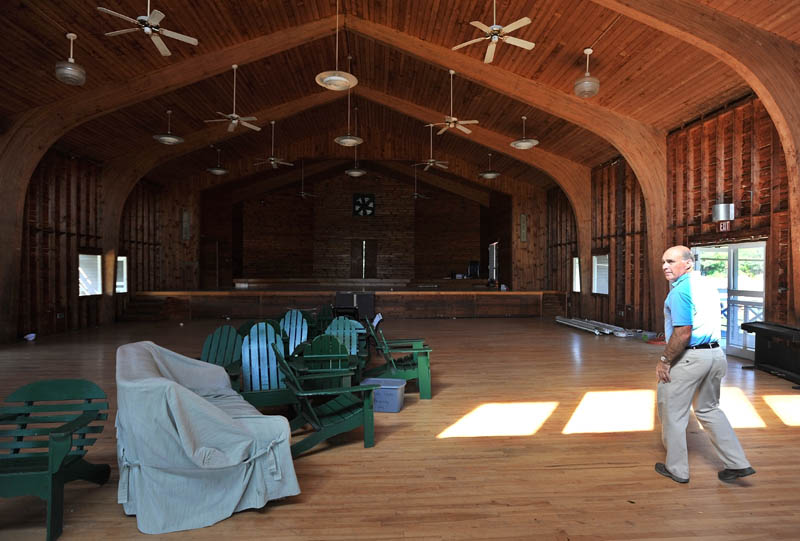SIDNEY — Motorists who drive down Pond Road may wonder about construction activity at the New England Music Camp. The hole in the ground, which will become a foundation for an addition to the camp’s Alumni Hall, is just the beginning of a five-year plan that third-generation camp owner John Wiggin hopes will transform the location into a major player, both in central Maine’s arts scene and in the local economy.
The plan, which Wiggin hopes to finance with a $12 million fundraising effort, is centered around a new flagship building — a 40,000-square-foot arts-and-education complex that will host year-round performances, conferences and retreats, and education classes that could include programming as a charter school.
Wiggin’s grandfather purchased the 40-acre camp on the shore of Messalonskee Lake in 1937. It has remained in the family since, with Wiggin taking over in 2009. He said a successful executive career, including a stint at ITT Hartford Life Insurance Co., has prepared him for the fundraising plan.
“The numbers don’t scare me,” Wiggin said. “I’ve gone from zero or a small group of employees to having a couple thousand people in relatively short periods of five to 10 years. I’m comfortable with the growth plan.”
While the fundraising campaign won’t launch officially until 2013, Wiggin said he has been working actively on the growth plan since last year.
“The first phase is really going out to the community, because at the end of the day, the community is the biggest benefactor,” he said.
Wiggin has spent the last nine months meeting with community stakeholders, including town officials, state legislators, school superintendents, chambers of commerce and area colleges.
“What I didn’t want to do was go to our donors without good stakeholder support,” he said. “If a foundation, a trustee or someone doing due diligence on us went to any member of the community, there’s a pretty good chance that they would know about the project and would have an opinion about it.”
New uses
One potential benefit to the area’s economy would be the expanded camp’s potential to capture dollars that are being diverted to conference centers along Maine’s coastline. Wiggin said that, in meeting with the Maine Arts Commission in Augusta, he heard a sentiment that there is a lack of facilities in the region for conferences and retreats held by government and nonprofit groups.
“There’s no place in central Maine to have meetings,” Wiggin said. “They all go to the coast.”
Wiggin said the new building, which will include seven or eight classrooms, a conference room, and a 3,500-square-foot lobby, will take the camp’s ability to host events to a new level.
The camp also has added an employee tasked with exploring the possibility of what could be Maine’s first charter school for the arts.
“What we’re trying to do is work with the local superintendents to look at the feasibility,” he said. “I don’t want to try to compete with them. I want to work with them to create a music program that’s good for all of central Maine.”
Wiggin said students could split their time between their existing public schools and the charter school, with the institutions also splitting public education dollars for that student.
Moving forward
While Wiggin expects the fundraising campaign to last into 2015, he plans to begin construction on the complex much sooner, breaking ground in the fall of 2013.
“Once we have good commitments, we feel we can start down the road,” he said. “We don’t need to wait to have the cash in hand.”
In order to accelerate the process further, current renovations and building projects will be done with the complex in mind. By the end of the year, a water storage tank will be in place, as well as underground conduits for water and power.
“We’re taking on all of the infrastructure now,” he said. “The thinking is that if we didn’t raise the money, it’s all stuff that we will have to do anyway that will significantly improve the programming experience.”
Plans also include renovations to existing buildings that will allow use for at least seven months a year, and the addition of a new boy’s dormitory to house college students and adults.
The added conference revenue, coupled with the capacity to host students year-round, would allow the camp’s annual revenue, currently about $1.5 million, to triple, Wiggin estimated.
He said that the camp has the potential to become a centerpiece for performance arts in Maine.
Wiggin envisions the camp attracting regional orchestras for both youths and adults, as well as a music school that could host private teachers and students on everything from dance to creative writing in specialized studio spaces.
Matt Hongoltz-Hetling — 861-9287
mhhetling@centralmaine.com
Send questions/comments to the editors.



Comments are no longer available on this story